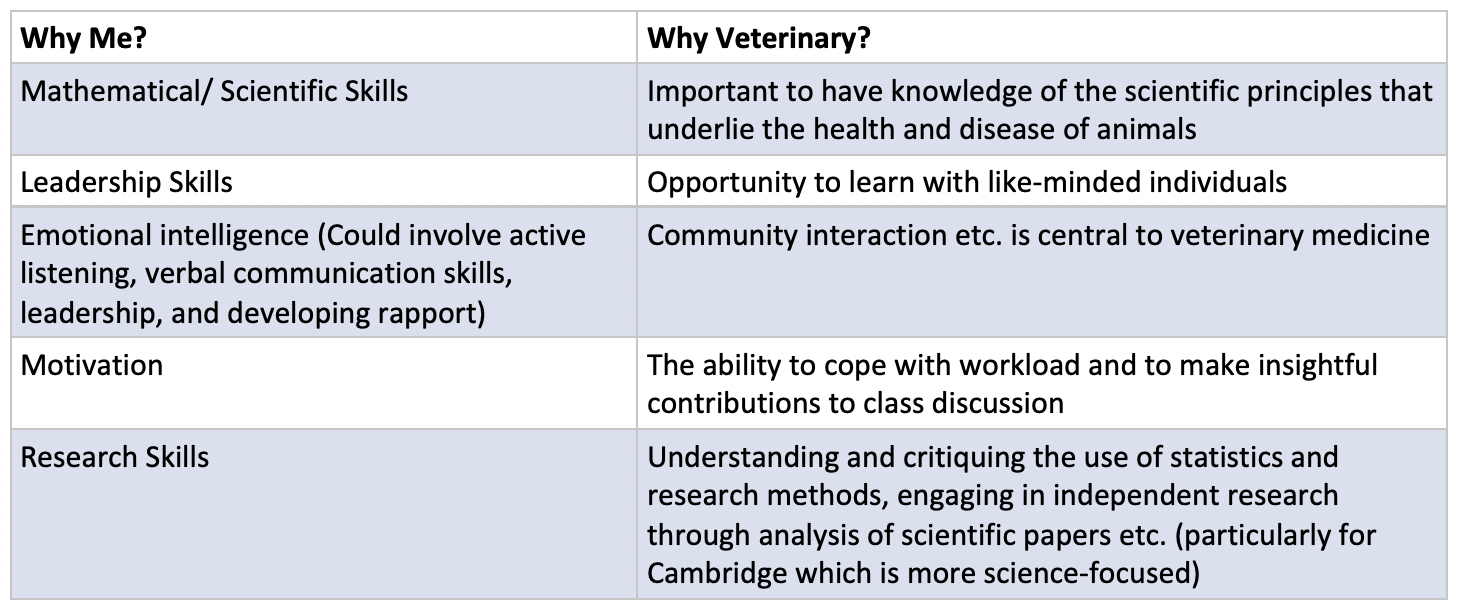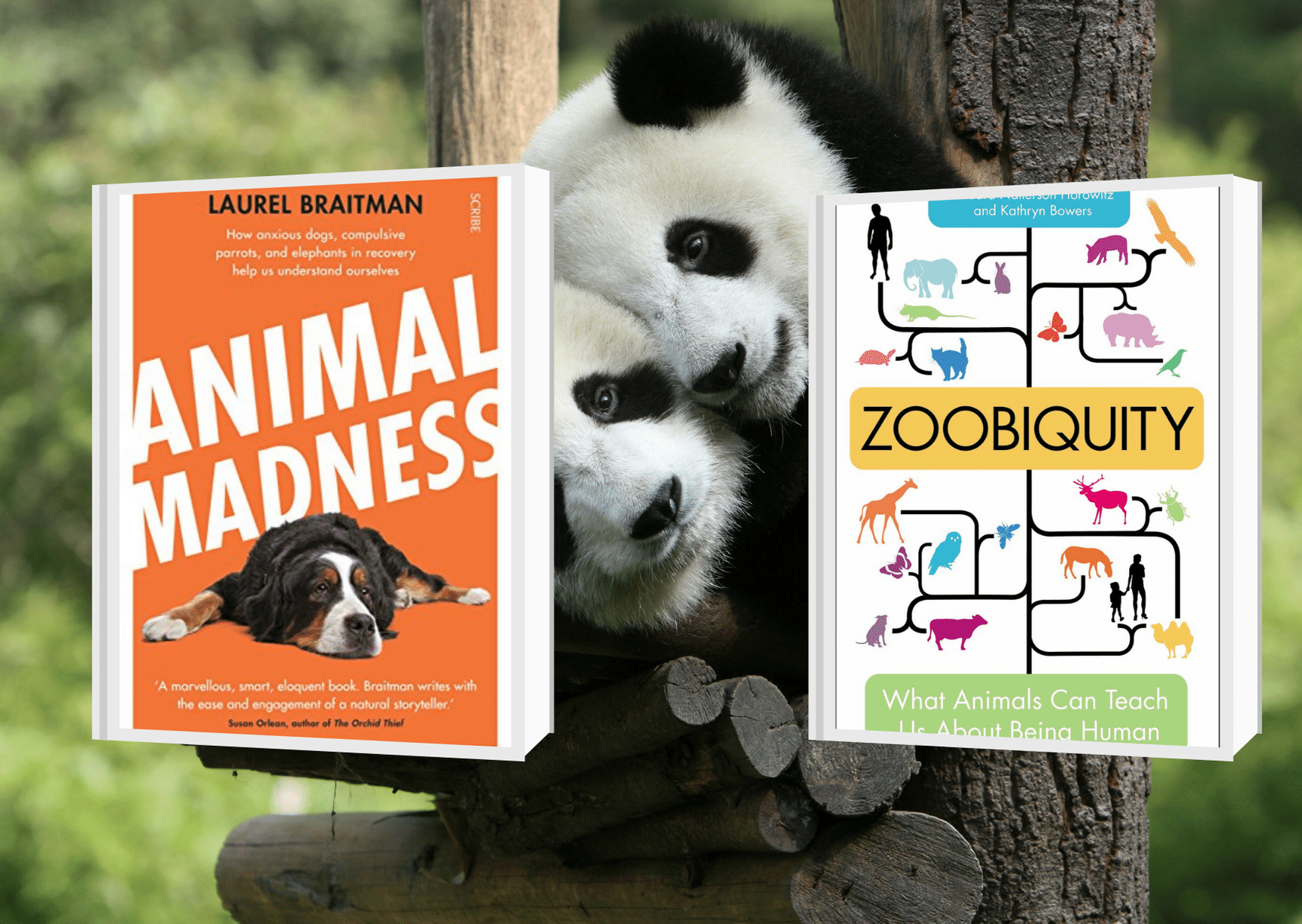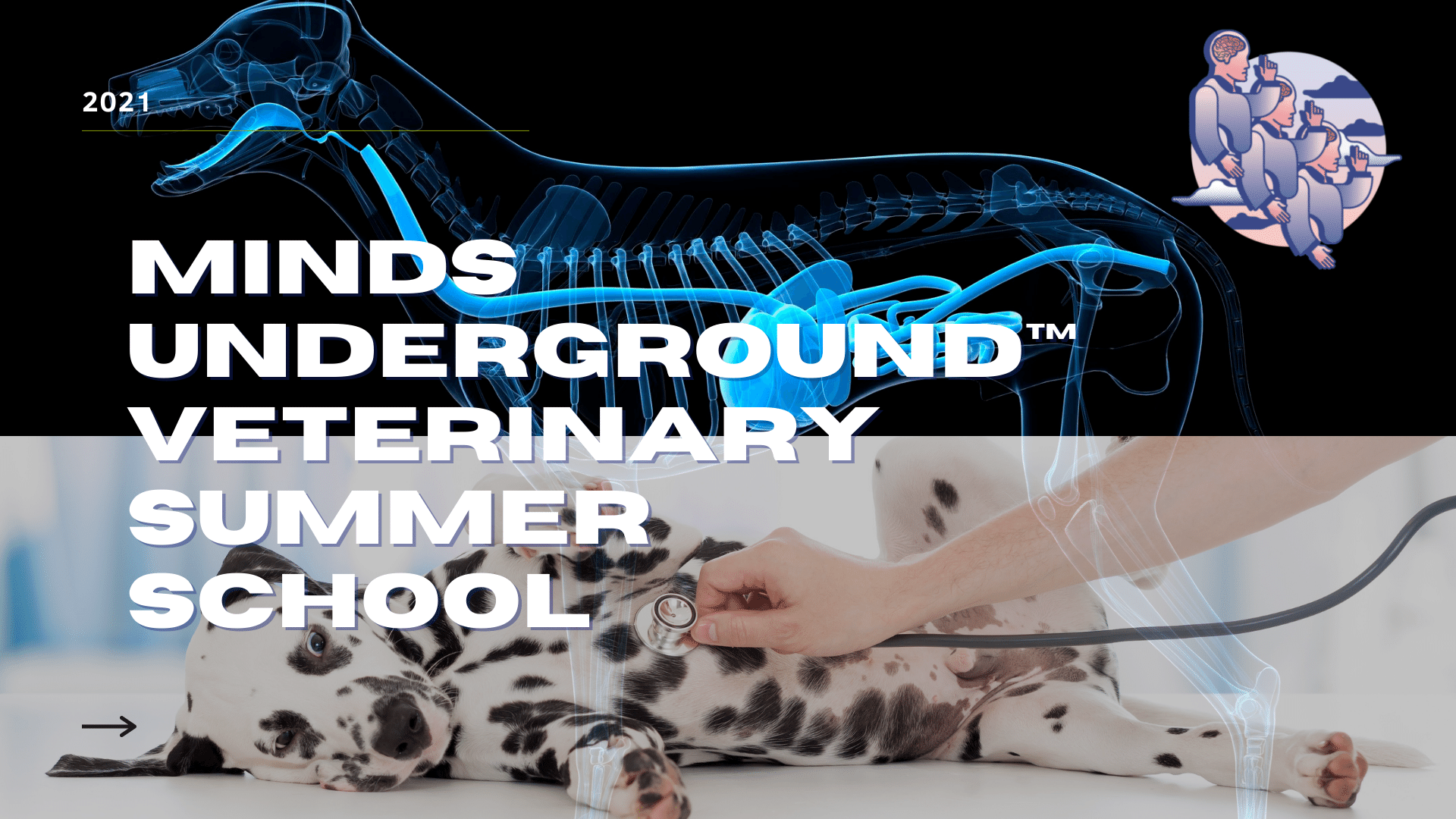Top Tips for a Winning Veterinary Personal Statement
Insights from Cambridge & RVC Graduates
Applying to vet school can seem intimidating. In this article, we hope to demystify the process for you, discussing top tips for writing your personal statement, exploring the subject prior to interviews and preparing you to follow your veterinary dreams!
Preparing a Veterinary Personal Statement
When writing your personal statement for veterinary medicine, it is important to ensure breadth and depth, discussing topics in detail and ensuring you can mention a range of different topics/ experience to show a wider knowledge of the subject area. Make sure you mention people as well as animals, and choose topics you would be comfortable discussing further at interview.
Why are you applying?
Before you begin preparing for your veterinary application, it is worth taking a few minutes to think about the reasons why you wish to study veterinary medicine. This will be crucial for writing your vet personal statement and you may be asked about your motivations for applying at interview. Your reasons for application should be well-thought out and specific. When you have some work experience of volunteering done, you can incorporate these experiences in your answers.
Begin by planning how you will structure your response. You could split your answer into three sections:
1. Why the university?
Extensively research the university, societies you might want to join etc. and know the style of veterinary school. N.B. Most veterinary schools will have a page dedicated to what they want from applicants - take your cue from them and include some of these details in your veterinary personal statement.
2. Why veterinary?
Think about what YOU will gain from the degree itself
Think about what the degree will allow you to do once you are done e.g. The different routes you could take: Veterinary surgeon, zoo industry, scientific research, higher education lecturer, conservation work, charity sector (RSPCA) etc.
Ideas: You could think about how veterinary scientists benefit our community, maintaining animal welfare standards, improving food security, informing policy changes, the lifelong learning experience…
What are your ambitions? What interests you about veterinary medicine?
Consider the top 6 qualities you think it will be most important to evidence in your personal statement – consider practical and non practical skills
All of these questions are useful prompts to help you unpack your motivations and write a convincing veterinary personal statement.
3. Why are you a suitable candidate?
When answering "Why me?" style questions at interview, or brainstorming when writing your personal statement, you must be able to demonstrate your quality and relate back to veterinary.
What makes YOU suitable for this subject? What relevant skills do you have? What relevant experiences or achievements can evidence these skills?
Which qualities would your chosen university most admire? e.g. practical skills, communication skills, problem solving, empathy and sensitivity
Work experience is great to mention as the stimulus that led you to apply for veterinary medicine, rather than just "helping animals", which is the formulaic answer a surprising number of students give! Work experience placements also make perfect examples for questions on your skills/ attributes and veterinary as a career.
Example skills
Ensuring breadth and depth in your Vet personal statement
Those who are going to review your personal statement for university admissions, or interview you, live the subject. They have decided to dedicate their lives to studying this discipline. Therefore, it is important to show that you are closely involved with the subject, even though it is not a subject studied at school. How to do this?
Independent Reading to Enhance Your Vet Personal Statement
Evidence of off-curriculum exploration and outside reading is crucial to include in your veterinary personal statement if you want a place at the top veterinary schools. Research some relevant topics in veterinary medicine such as one health, bovine tB, animal welfare, pet obesity and nutrition (80% of horses are obese!), euthanasia and equine notifiable diseases.
Also think about current "“hot topics” in veterinary e.g. equine herpes virus is a hot topic in the UK after a recent outbreak. Students may also like to mention Covid-19 on their personal statement and the questions/ issues the pandemic has thrown up e.g.
Zoonotic diseases (diseases spread between animals and people): The origins of the pandemic are unclear
Coronavirus in pets e.g. dogs: https://www.cdc.gov/coronavirus/2019-ncov/daily-life-coping/animals.html - Concerns over animals/ pets with reported SARS-CoV-2 infection resulted in vets being pooled into the research
The effectiveness of tele-consultations/ whether this accelerated the possible digitalisation of some elements of veterinary practice
The importance of non-emergency treatments: Vets encourage dog owners to come for vaccinations each year, but these were classes as non-emergency during the pandemic. Does this mean vaccinations are not essential for dogs?
Are vets key workers? (They were not classes ad key workers originally)
Puppy farming/ ethics of imported rescues
Pet travel/ passports
You could keep a reading chart with a page dedicated to each veterinary related topic that you research for your vet personal statement. This will be useful for personal statement writing and prospective interviews too. To practise for interview, why not try presenting the topic out loud and pre-empting questions?
If you’d like further guidance on useful resources to enhance your reading for your vet personal statement, you could take a look at our Veterinary Science interview preparation guide. Alongside a bank of useful resources and questions to help you prepare for interview, this pack also contains great reading suggestions and thinking activities to develop your vet personal statement.
Resources
New Scientist: Great for articles on current affairs in veterinary science:
BBC Radio 4 In Our Time: You’ll find a number of veterinary-related episodes e.g. “The Evolution of Horses” or “Echolocation”
Reading:
Animal Madness by Laurel Braitman
Zoobiquity by Barbara Natterson-Horowitz and Kathryn Bower
Talking about work experience in your Vet Personal Statement
Mention a range of different topics in your personal statement for veterinary medicine to show a wider knowledge of the subject area
Pick a topic or experience to discuss in more detail in your vet personal statement, but use this to show off a quality of yours
Example: Communication skills are central to being a successful vet – you could mention how you used communication skills during work experience or watched a vet demonstrate communication skills in a challenging scenario such as an angry or upset client
Work experience:
Consider which of these placements you have enjoyed the most, and why
Consider a time during your work experience placements when you have learnt something about the practical aspect of working in veterinary science, and also a non-practical aspect
You could also refer to examples of cases seen during work experience
Extracurriculars in Vet Personal Statement
These may or may not be relevant to veterinary science. If unrelated e.g. a sport, public speaking, music, ensure you link back to why undertaking the extracurricular activity stands you in good stead for a veterinary degree i.e. what skill has it honed? Mention of non-veterinary related extracurriculars should be c.4 lines at the end of the statement.
Example Activities:
Write, write, write! For other subjects, essay competitions are a great way of delving into a topic area in depth and trying your hand at high level academic writing. Whilst veterinary competitions are slightly harder to come by, there are some opportunities for students to get involved in/ mention on their personal statement. Even if the deadline is passed, why not practise brainstorming an answer to, essay planning, or writing a full essay in response to the questions? Questions such as these could also be asked at interview. Even if you don’t mention the competition, you could mention an interest in the field on your personal statement or even turn it into an independent research project
The Society for Veterinary Medical Ethics Competition: Example Question - “Even when animal euthanasia is ethically indicated, many veterinarians and vet staff become stressed because they feel like executioners. What might change their paradigm?”
Lucy Cavendish College Veterinary Competition: Example Question - ”’Brachycephalic dogs spend their entire lives struggling to breathe. Their popularity is regrettable and their breeding should be strictly regulated.’ Discuss.”
Newnham College, Cambridge Biological Sciences Competition: Example Question - “Replace, reduce, refine: Why do we still need to experiment on animals?”
Our co-curricular division, Minds Underground, also has a Veterinary Essay Competition ideal to mention in your veterinary personal statement. Example Question - “Why are fierce predators scarce?”
Research Projects
Zooniverse allows you to take part in science research projects from home. For example, the project “Whooping Cranes” involves virtually looking for large white birds (Whooping Cranes) in Northern Canada to monitor the population of the endangered species, or the “Monkey Health Explorer” project allows you to learn more about monkey health by identifying white blood cell types
We also offer specialised research projects through our co-curricular division, Minds Underground™. The projects are great to mention on vet personal statements, and make impressive talking points at interview, particularly for top UK universities such as Cambridge, who favour applicants with an interest in scientific research
These are typically taken over a 4-week duration, involving weekly hour-long project tutorials and a final review session. The aim is to combine teaching of high-level subject-specific content with exposure to real-world applications of these concepts, giving you the opportunity to undertake a project that is both useful for a university application and future career
We have a selection of projects available on the website, but further veterinary projects can also be customised around your interests with a mentor who has a specialism in the field.
Veterinary Courses/ Masterclasses
We run an online Veterinary Summer School (June - August), with two hosts from the Royal Veterinary College
If you have missed the summer course, we also host all of the masterclasses as 1-1 sessions, price on application. Example masterclasses: https://www.mindsunderground.com/stem/veterinary
Boost your Vet Personal Statement with out Online Summer School
Our co-curricular division, Minds Underground, runs a Veterinary Summer School designed to boost your veterinary personal statement with lots of interesting talking points for interview.
Through 12 interactive masterclasses on topics such as “Immune Response and Vaccines”, “Basic Life Support and First Aid in the Emergency Patient” and “Veterinary Case Studies: The Vomiting Dog, The Cat Losing Weight, and the Horse with Colic”, our summer school will help enhance your knowledge and boost your confidence.
Hopefully this article has given you more of an idea as to how you should go about content building, writing and structuring a standout vet personal statement. Be concise (you only have 4000 characters!), be honest and speak in detail about specific interests within the veterinary course, emphasising a few in-depth discussions of experience and topics of interest to convey your passion for the subject.
Looking for a Personal Statement Tutor or Support For Your Wider Veterinary School Application?
Veterinary Science Personal Statement
U2’s Oxbridge-educated mentors have a close insight into what admissions tutors like to see in a veterinary personal statement, and can help students to convey their skills, motivations, and long term goals, in order to stand out from other applicants. The statement should be the candidates own work, but our mentors will provide direction and guide you through the process of content building and writing. We offer offline drafting as well as tuition sessions.
Veterinary Mentoring (Cambridge, RVC and More)
U2 offers both ad hoc tuition and wider Medical School / Oxbridge Mentoring programmes (book a free consultation to discuss options). We have a great team of Cambridge-educated and RVC Veterinary mentors, with experience supporting students in application to the UK’s top veterinary schools.
The Process:
1) We suggest a Veterinary mentor and send their full CV for review. Our mentors are deeply familiar with the admissions process and are well-placed to guide you through personal statement curation, test preparation (if applicable) and the interview process. We may suggest a range of application tutors to choose from with slightly differing rates depending on qualifications and level of experience.
2) We typically suggest beginning with a 1.5 hour informal assessment/ taster session, where the mentor will informally assess the student’s current performance level for application. Following this, we issue a report with feedback, and structure a plan to best prepare.
3) U2’s approach for regular veterinary application sessions: The main focus of tutorial sessions will be to explore material that can be discussed in the personal statement and at interview. Mentors ensure each student refines their interests within veterinary, and is exposed to a range of key themes and topics. Together, we build a case for the student, solidifying the stance and direction they will take during interview.
Frequency of sessions can be decided between student and mentor. Students can take either ad hoc sessions, or we structure a full programme for preparation, which may include further co-curricular opportunities such as our research projects, Veterinary summer school and mock interview days.
Sessions from £70/h.





